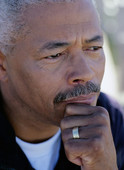
WEDNESDAY, Oct. 27 (HealthDay News) — When it comes to feelings, new research suggests that the past is not always prologue. People tend to have worse and more intense views on events that might happen down the road than identical events that have already taken place.
The observation touches upon perceptions of fairness, morality and punishment, the study noted, as people apparently take more extreme positions regarding events that have yet to occur.
Thinking about future events simply tends to stir up more emotions than events in the past, study author Eugene Caruso, an assistant professor of behavioral science with the University of Chicago’s Booth School of Business, explained in a university news release.
The findings were published in a recent online issue of the Journal of Experimental Psychology: General.
Caruso’s conclusions are drawn from several experiments conducted to assess feelings regarding past and future occurrences.
In one instance, study participants expressed their feelings regarding a soft drink vending machine designed to hike up prices as temperatures rise. People had stronger negative reactions about the fairness of the notion when told that the machine would soon be tested than they did when told that the dispenser had already been put in place a month prior, according to the report.
Similarly, participants were asked to render verdicts on the behavior of two late-night TV hosts coping with a writer’s strike. Reactions to the notion that both would cross the picket line to go back on the air without writers were much harsher when the scenario was discussed as a future development as opposed to something that had already occurred. Overall, those who were told this would happen before it happened were more likely to say they would watch the respective shows less often.
In fact, the past-future dynamic seems to similarly apply to positive developments, as another experiment revealed that large charitable donations yet to happen were deemed to be more generous than the same donation already signed, sealed and delivered.
Caruso theorized that underlying this divergence of opinion is a tendency to prepare for the future armed with heightened emotions. By contrast, people look back on history with a more rational take that intuitively seeks to make sense out of what had been emotional experiences, the findings indicate.
Hence the past becomes “ordinary”; the future extraordinary.
More information
For more on conflict and perception, visit the University of Wisconsin-Madison.

